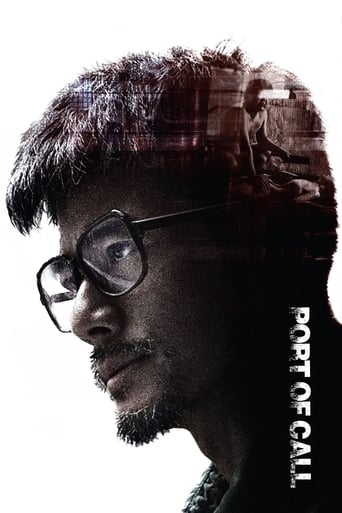grandmastersik
Incoreherent and Dull are two words that describe this cinematic disaster.With Aaron Kwok on the cover (I'm a fan!) and having read the back, I was convinced that Port of Call was well worth the rental. I was wrong.Based on a real-life case, a detective (Kwok) investigates the presumed murder of a teenage prostitute. By this, I mean that a boat-load of blood has been found - which matches the DNA of a missing girl - but no body... any and all suspense then goes out the window as some bloke strolls into a police station and admits his guilt.With an excellent DoP and a case that supposedly gripped Hong Kong, I can see why Kwok got involved - hell, maybe the screenplay was decent too? But the end result (perhaps the director's or editor's fault?) is a heavily disjointed mishmash of scenes, none of which hold much dramatic value nor build any of the cast's characters. I honestly tried hard to like the film but it's an almost empty attempt at - what? Being arty? Trying to say something the bland characters cannot spell out? - that after an hour, I couldn't suffer it any more... and with so many films in my To Watch pile and so little time, I can ill-afford wasting a full 90 minutes on what it so obviously a stinker.And that's my advice to you all too: avoid.
quincytheodore
"Port of Call" is a thriller definitely not for everybody, it walks a very fragile line of uncomfortable vices. The approach is done as realistically as possible with crude language and plenty of outright yelling. The scenes are not grand thriller, it's muddied yet invitingly dark, though slightly hampered by odd burst in the pacing.The movie, on the surface, is a story about certain crime investigation. A young girl is missing and a detective digs into her life and associates. The more he uncovers the more secrets this young lady harbored, soon it's a one way trip into drugs and murder. One strangely twisted beautiful thing about this is how the story of the woman, her concerned and hopes, is told after the crime.It's an intimately gripping thriller, and the risqué parts are done with finesse, but it might deter the audience with the hectic pace. Transition between investigation and the past can overlap as the movie is divided into chapters, which in turns reveal particular people's connection and aspects of their lives.This can be dauntingly diverse since the information overload is felt throughout and the shift occurs very fast. It's as though several jigsaw puzzles are thrown in random order, it may fit eventually but it's likely to confuse audience early on. It's not intended for a cerebral crime and more of one with passion.There's ample of human drama and struggle in "port of Call", admittedly it's engagingly dark, however an occasional plodding sidetrack might be too distracting for the investigation viewpoint.
moviexclusive
'Port of Call' belongs to that rare breed of Hong Kong film that strives to be social commentary. Indeed, that shouldn't come as something surprising for those who have seen writer/ director Philip Yung's previous two works, 'Glamourous Youth' and 'May We Chat'. Here, Yung dramatically raises the stakes by basing his story on a gruesome, real-life murder case which shocked the nation back in 2008, so like its real-life inspiration, 'Port' revolves around the murder of a young girl that draws three distinct individuals together.On the first hand is 16-year-old Wang Jiamei (Jessie Li), who moves to Hong Kong in 2009 to live with her mother, stepfather and older biological sister. Over the course of a fractured narrative divided into three chapters, we will come to learn of Jiamei's ambitions to be a model that led to her auditioning for a dodgy talent company which uses her not as a photo-model but as talent scout, and how that eventually leads her to become a 'paid escort' so she doesn't have to ask her mother for money for material stuff she wants to buy. In particular, her life of prostitution leads her to fall in love with a bookish but nonetheless handsome-looking twenty- something who promptly throws her under the bus when he is confronted by his girlfriend, leaving her emotionally devastated and emptier than ever before.The next character we are asked to pay attention to is Ting Tsz- chung (stage actor Michael Ning in his bigscreen debut), a stocky short- fused meat deliveryman who also happens to be a triad member. Very early on, the tenement house where Ting lives is the site of a grisly murder where the victim was dismembered and subsequently disposed of in various locations all over town, and Ting turns himself in shortly after to confess his role in killing Jiamei after a drug-addled night of paid sex where Jiamei asks Ting to murder her. The whodunit isn't what Yung is after here; rather, the second chapter entitled 'A Lonely Person' in particular tells of how Ting was unceremoniously dumped not long before he meets Jiamei by a girl whom he had a sweet and soft spot for.Finally, there is Chong-sir (Aaron Kwok), a Regional Crimes Bureau detective assigned to Jiamei's case with his partner Smoky (Patrick Tam). Like Kwok's recent 'detective' roles, this one comes with its own quirks – not only is his physical appearance, complete with an unflattering crop of graying hair, rumpled clothes and ill-fitting glasses, slightly disorientating to say the least, Chong-sir loves to take his own picture using a Polaroid camera at murder scenes and the homes of other people he interviews as part of the investigation. As much as Jiamei's is an open-and-shut case, Chong- sir is intrigued by just how a young girl like Jiamei would end up in such a predicament, that curiosity driven in part by his own role as a father.Like we said earlier, Yung chooses to tell his tale by moving back and forth in time, and that choice of narrative structure does take some time to get used to, to say the very least. As its title suggests, the first chapter 'Seeking Mei' is probably the most disjointed, comprised of scenes that do not intuitively gel with each other; the middle chapter gets slightly more coherent, in part because it is also where the past and present timelines meet and things happen in a more linear fashion. But altogether, the film demands a fair bit of patience and focus on the part of its viewer to keep seemingly disparate events in mind with the promise that it will all start to make sense towards the end.Amidst the somewhat uneven and inconsistent pacing however is an absolutely consistent sense of ennui, sadness and even anguish. Jiamei, Ting and Chong-sir are all lonely individuals in their own way – one who finds her hopes of companionship dashed by a 'bastard', one who finds his feelings unreciprocated, and one who has become estranged from his wife (now ex-wife) and daughter over the years because of his work. The world they inhabit is similarly bleak, captured by cinematographer Christopher Doyle in all its harsh beauty whether the gritty alleys or cramped working-class apartments where isolated souls are faced with their own misery.Especially defined with acute poignancy is Jiamei's growing disillusion with life, meant undoubtedly as a symbol of a whole segment of youth who are searching for purpose and fulfilment in their lives but who come out empty. That we feel so deeply for Jiamei is also credit to newcomer Jessie Li's heartfelt performance, conveying her character's fragility, melancholy, desolation and eventual despair as a result of her displaced upbringing as well as her displacement from society. Li is matched by an equally gripping performance by Ning, who brings pathos to his loner character so that we feel for Ting than regard him as a psychopath.That's not to say that the film is perfect; that it most certainly isn't, and for one, it isn't hard to imagine a much more powerful film if the storytelling were more focused and the characters more well-defined. Yet there is something hypnotic and mesmerising about it, about the way it portrays the state of disfranchised youth in society, about how it gives voice to their frustrations, anxieties and hopelessness, and most of all about how relevant it is. It is for these reasons that 'Port of Call' stays with you long after the credits are over, provoking you to think about the Jiameis and Tings in our midst and what we can do to avoid the tragedy that brought this film to being in the first place. It may not be the best Hong Kong film you'll see this year (notwithstanding its official submission by the territory to the Oscars), but it is probably one of the most significant.
Jim
In Cantonese, Mandarin and bits of English. Set in Hong Kong. Based on an actual event.Contains a strong plot and a somewhat over long narration.The first part covers the discovery of the crime and the police investigation. The second part tells the story of the 'victim'. The third part unravels the motivation. Horrifying and sad, but gives closure to the detective (Aaron Kwok).Good human interest story without the psychoanalysis. Aaron Kwok plays an eccentric detective. Fine performances from the young cast; Jessie Lin and Michael Ning.Warning: It's for an adult audience. Some steamy sex scenes and gore.




